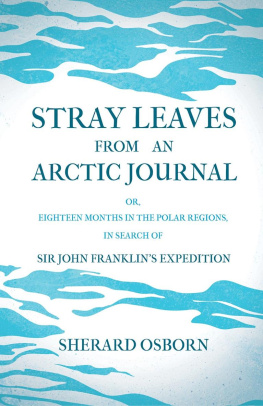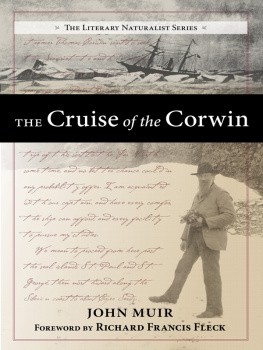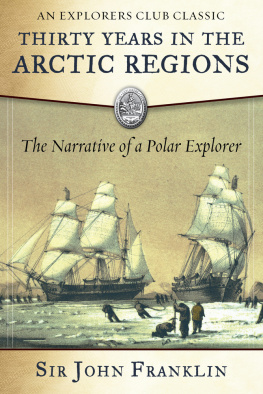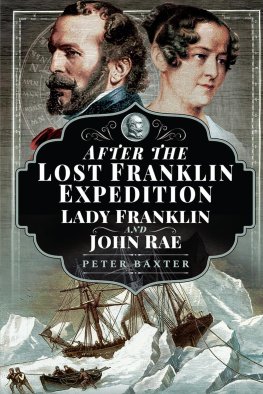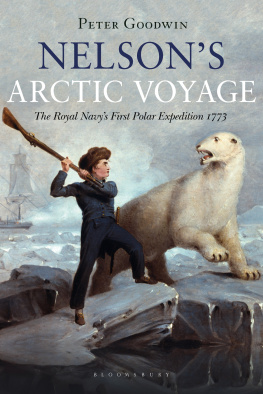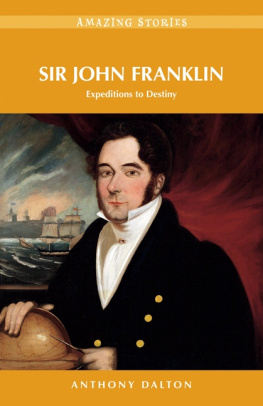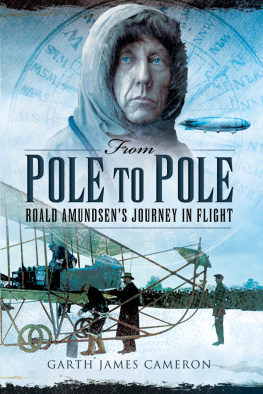STRAY LEAVES
FROM AN
ARCTIC JOURNAL
OR,
EIGHTEEN MONTHS IN THE
POLAR REGIONS, IN SEARCH OF
SIR JOHN FRANKLIN'S EXPEDITION
By
SHERARD OSBORN
First published in 1852
Copyright 2021 Read & Co. History
This edition is published by Read & Co. History,
an imprint of Read & Co.
This book is copyright and may not be reproduced or copied in any
way without the express permission of the publisher in writing.
British Library Cataloguing-in-Publication Data
A catalogue record for this book is available
from the British Library.
Read & Co. is part of Read Books Ltd.
For more information visit
www.readandcobooks.co.uk
DEDICATED TO
LADY FRANKLIN
Contents
SIR J OHN FRANKLIN
By John K nox Laughton
DEDICATION
PREFACE
STRAY LEAVES FROM AN AR CTIC JOURNAL
DEPARTURE
PL AN OF SEARCH
THE ATLANT ICGREENLAND
WHALE- FISH ISLANDS
T HE ESQUIMAUX
AN ARCTIC NIGHT
GODHAAB
HERR AGAR
LEAVE DISCO
THE SHIPS
THE SCREWS
UPPERNAVIK
A CHECK
TOWI NG THE SHIPS
CAP E SHACKLETON
A BEAR HUNT
ARC TIC SPORTING
MELVILLE BAY
AN OLD WHALEMAN
DOCKIN G IN THE ICE
TRACKIN G AND TOWING
FAVOURA BLE PROSPECT
NARWHALES
ANXI ETY AND HOPE
DISSOLUTION O F AN ICEBERG
"PIO NEER" NIPPED
LIEUT. HA LKETT'S BOAT
CHAR GING THE ICE
DETENTION O FF CAPE YORK
TH E WEST WATER
LAN CASTER SOUND
ICEBERGS AND GLACIERS
A GALE IN BAR ROW'S STRAIT
STEAMING UP BA RROWS STRAIT
TRACES OF SIR J OHN FRANKLIN
TRACES OF THE LOS T EXPEDITION
FRANKLIN'S WIN TER QUARTERS
GRAV ES OF SEAMEN
BE ECHEY ISLAND
S LEDGE TRAILS
WELLIN GTON CHANNEL
THE WHITE WHALE
CROSSING WELLIN GTON CHANNEL
ALL THE VESSELS MEET
THE COMING ON OF WINTER
THE AMERI CAN SQUADRON
GO INTO WIN TER QUARTERS
LIEUTENANT MECHAM 'S ADVENTURE
RUINS ON CORNW ALLIS ISLAND
A WINT ER'S EVENING
AUTUMNA L TRAVELLING
AN A RCTIC PRAYER
WINTER OCCUPATIONS
WI NTER SCENERY
OPEN WATERS IN BAR ROW'S STRAIT
CHRISTMAS- DAY ON BOARD
AURORAS AND CLO UDLESS SKIES
WINTER EMPLOYMENTS
MASK BALLS
ROCK ETSBALLOONS
CARRIER-P IGEONSKITES
DESULTORY OCCUPATIONS
PREPARATIONS FO R TRAVELLING
NORTH-WE ST DISCOVERY
ENGLISH N.W. DISCOVERIES
NORTH-WE ST DISCOVERY
ADVANTAGE OF WINTERIN G IN HARBOUR
SLED GE EQUIPMENT
SCALE OF PROVISION
GRAND SOU THERN SEARCH
DIVISION S OF SLEDGES
SLEDGES RE ADY TO START
TRAVELL ING BY NIGHT
COLD AND FROST-BITES
INJURY TO THE EYES
ZEA L OF THE MEN
PLE ASING DREAMS
CONCLUSIO N OF JOURNEY
LIEUTENANT M'CLIN TOCK RETURNS
DISAPPEA RANCE OF ICE
ASSIST ANCE HARBOUR
BARROW'S STRAIT CLEAR OF ICE
STEAMING FOR ASSIST ANCE HARBOUR
DEPARTURE FOR J ONES'S SOUND
STOPPED B Y ICE-FIELDS
ERECTIO N OF A CAIRN
EASTERN SIDE OF BAFFIN'S BAY
VISIT FR OM ESQUIMAUX
GALE IN THE PACK
FORCING THRO UGH THE PACK
ESQU IMAUX TRACES
SEARCH FOR TH E "INTREPID"
OPINION OF FRIENDS AN D THE PUBLIC
CHANCES OF FU TURE SUCCESS
SIR JOHN FRANKLIN
By John Knox Laughton
Arctic explorer, the twelfth and youngest son of Willingham Franklin of Spilsby in Lincolnshire, was born on 16 April 1786. It had been intended to bring him up for the church, but a holiday visit to the seashore excited a strong desire to go to sea, which his father vainly endeavoured to overcome by sending him for a voyage in a merchant vessel as far as Lisbon. On his return he entered the royal navy on board the Polyphemus, then just sailing for the Baltic, where she played a leading part in the battle of Copenhagen. Two months later Franklin was appointed as a midshipman to the Investigator, under the command of his cousin, Matthew Flinders , and on the point of sailing for Australia. While in the Investigator Franklin distinguished himself by his remarkable aptitude for nautical and astronomical observations; he was employed at Sydney as assistant in a little observatory which Flinders established, and won the notice of Captain King, the governor, who used to address him familiarly as Mr. Tycho Brahe. When the ship's company was broken up after the wreck of the Porpoise, Franklin accompanied Lieutenant Fowler to China in the Rolla, and, taking a passage home in the East India Company's ship Earl Camden, was with Commodore Dance in his extraordinary engagement with Linois (15 Feb. 1804), on which occasion Fowler commanded on the lower deck and Franklin took charge of the signals. On arriving in England Franklin was appointed to the Bellerophon, in which he was present in the battle of Trafalgar, again having charge of the signals, and being one of the few on the Bellerophon's poop who escaped unhurt. Two years later he joined the Bedford, and, continuing in her after his promotion to lieutenant's rank (11 Feb. 1808), was employed on the home station till the peace in 1814, when the ship was ordered to North America, to form part of the expedition against New Orleans. In a boat attack on some gunboats in Lac Borgne Franklin was slightly wounded; and he had besides a full share in the laborious duties of the campaign. Its failure may account for the fact that no attention was paid to the strong recommendation of Sir John Lambert, in command of the troops with which he had been serving, and that he remained a lieutenant, serving on board the Forth frigate, with Sir William Bolton, Nelson's nephew. With Franklin's appointment in January 1818 to command the hired brig Trent, fitting out to accompany Captain Buchan in the Dorothea, Franklin's career as an Arctic explorer commenced. Their instructions were to pass between Spitzbergen and Greenland, use their best endeavours to reach the pole, and thence, if possible, to shape a course direct for Behring's Straits. The two ships sailed on 25 April, sighted Spitzbergen on 26 May, and passed without difficulty along its western coast; they were then stopped by the ice, and, being driven into the pack on 30 July, the Dorothea received so much damage as to be in momentary danger of foundering. They got into Dane's Gat, where such repairs as were possible were executed, but it was still very doubtful whether she could live through the passage home, and further contact with the ice was clearly out of the question. Buchan's instructions fully authorised him in this contingency to move into the Trent and send the Dorothea home; but he was unwilling to appear to desert his shipmates in a time of great danger. The Dorothea's state was such as to forbid her being sent home unattended, and Franklin's request that he might be allowed to go on rendered the task of superseding him the more disagreeable. So Buchan judged rightly that his proper course was to take the Dorothea home, with the Trent in close attendance on her. They arrived in Englan d on 22 Oct.

